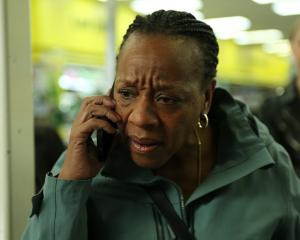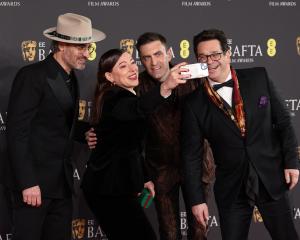"Things like this didn't happen in Christchurch."
That comment, made by a former Christchurch Girl's High School classmate of convicted murderers Pauline Parker and Juliet Hulme, might have encapsulated the mood of 1950s life in the South Island city, yet it only partly explains why the grisly episode continues to fascinate some.
His interest in the case initially piqued by director Sir Peter Jackson's 1994 film Heavenly Creatures, United States film-maker Alexander Roman has rolled up his sleeves and delved into a dark slice of New Zealand's history.
Roman's 90-minute documentary Reflections Of The Past, re-examines the gruesome details of how 16-year-old Pauline Yvonne Parker and 15-year-old Juliet Marion Hulme beat to death Parker's mother, Honora Mary Parker, on June 22, 1954.
Hulme was due to emigrate to South Africa following the break-up of her parents' marriage; both girls mistakenly believed Parker would be allowed to join her there; the idea was stymied by Parker's mother, who thus became the primary focus of their resentment.
Roman, via a series of interviews with classmates, legal experts, psychiatrists, counsellors and authors on the subject, also tells a larger story; one of love, teenage delusion and incumbent arrogance, family dysfunction and a societal hysteria prompted by courtroom discussion of a possible lesbian relationship between the teenage girls.
Born and raised in San Francisco and based in Los Angeles, Roman arrived in New Zealand last weekend to begin a nationwide tour in support of his big-screen debut.
Asked why he would want to research, write and edit a self-funded documentary on a murder case that happened in a foreign country some 57 years ago, Roman says his motivation was both personal and professional.
"I thought it would be an opportunity to do something that hadn't been done before," Roman explains via telephone from Auckland earlier this week.
"I am passionate about this story.
"For me, being a gay man, the important aspect of the Parker-Hulme case is the relationship.
"Homosexual relationships are lacking in Hollywood entertainment.
"That's not to say there are none, but I feel it is a niche rather than a mass market. Brokeback Mountain was the last really big production that went past the art-house level."
It is pointed out to Roman that much of the conjecture surrounding the nature of the girls' relationship was based on extracts from one diary - that of Pauline Parker - and, as some of those interviewed in his film suggest, diaries need not represent reality.
Bob Cotton, former chief reporter of Christchurch newspaper The Star, is quoted as saying: "It's the personal writings of a teenager and they were said to be quite imaginative, so what strength you put on them is a matter of evidence and is for the judge and jury to look at."
Neither Parker nor Hulme (who now both live in Britain) appear personally in Reflections Of The Past. Roman did try, but both declined.
"My initial approach to Reflections was to interview both Ms Parker and Ms Hulme. They are both very well aware of my film. I did not deal with Ms Hulme directly; it was through her literary agent, who conveyed that there would be no co-operation in regards to my film.
"As for Ms Parker, I sent her correspondence and made an attempt to meet with her. It was something that she also wished no participation in. I went in with the best intentions, but it simply wasn't viewed in that manner by either of them. But in many ways, it ended up giving me more freedom and openness."
Their non-appearance notwithstanding, Roman attempts to get to the heart of their relationship.
Just nine days before Parker and Hulme beat Honora Mary Parker to death with a brick in a stocking at Victoria Park overlooking Christchurch, a diary entry from Parker dated June 13, 1954 states: "We have now learned the peace of the thing called bliss and the joy of the thing called sin."
"That was to do with them becoming intimate with each other," Roman contends.
"It is Pauline expressing a night she had with Juliet. It is a very suggestive remark."
However, Hulme, when questioned about the nature of her relationship with Parker following the murder, replied: "But we're two girls; how could it be possible?"
It also came to light during the six-day Supreme Court trial that began on August 23, 1954, that Parker had engaged in a relationship with a male student while Hulme was in a sanatorium suffering from tuberculosis the previous year.
Yet when a psychiatrist for the defence, Dr Reginald Medlicott, questioned Parker about her relationship with the youth, she indicated she hadn't particularly enjoyed the sexual activity.
"Whether people want to say it was or wasn't [a lesbian relationship], it still had an impact," Roman says.
"After 57 years we are still talking about and debating the case. Even when you have one of the subjects, Anne Perry (Hulme changed her name by deed poll and is now a successful author), communicating to me and stating the relationship was simply an intense friendship, here's me questioning it.
"Someone in New Zealand brought up a good point last year. They said, 'Obviously, what she is saying hasn't convinced you, because you are still questioning it'."
More clear-cut is the brutal killing of Honora Mary Parker (45).
The pathology report makes for a chilling re-reading: "... crushing fractures of the skull indicated the woman's head was immobile on the ground when the blows were struck ... bruises on the neck indicated she'd been forcibly held by the throat."
Victoria Park tea-kiosk manager Agnes Ritchie, the first person to see Parker and Hulme when they arrived at her premises covered in blood on June 22, 1954, recalled Parker saying, "It's Mummy. She's terribly hurt. I think she's dead ... "
The pair's initial explanation was that Mrs Parker (also known by the surname Rieper, even though she wasn't married to Herbert Rieper) had fallen and struck her head, but such was the evidence at the scene that police soon established another scenario.
From a police interview with Parker: "When did you make up your mind to kill your mother?"
A: "A few days ago."
Hulme, who had initially claimed she wasn't there at the time the fatal blows were struck, confessed following the discovery of Parker's diary, in which she wrote of the girls' plan to murder Mrs Parker.
"I thought we would be able to frighten Mrs Rieper with the brick and she would give her consent for Pauline and I to stay together. After the first blows were struck I knew it was necessary for us to kill her."
After an initial inquest in July 1954, it was decided the murder case would proceed to the Supreme Court, at which the prosecution argued Parker and Hulme were "incurably bad"; their defence, meanwhile, claimed they were "mad", a position predicated on folie a deux, or jointly communicated insanity.
For that to be successful, however, it had to be proved that each had a proven psychiatric illness of such degree that they didn't realise the nature of their actions or were incapable of knowing it was morally wrong.
The trial ended on August 28, the jury retiring for less than three hours before finding both guilty of murder; in September they were sentenced to "to be detained at Her Majesty's pleasure" (i.e. a discretionary life sentence); Hulme was sent to Mt Eden, Parker to Arohata, near Wellington, each serving five years before being paroled in 1959 on the condition they not meet again.
Hulme immediately left for England, where she lived with her mother and stepfather; Parker moved to Auckland, then Wellington and continued tertiary studies before eventually leaving New Zealand.
• See it
Reflections Of The Past opens at Rialto Cinemas, Dunedin, on Thursday, May 19.
Overcoming challenges
Alexander Roman says it is a miracle his documentary has made it to the screen.
"This part of Pauline Parker and Juliet Hulme's life happened almost 60 years ago. Finding people with any connection or interest to create a discussion was difficult - especially being a one-man band for the most part.
"The biggest challenge I faced was the visual aspect. For many documentaries, you can see up to a hundred or more images of the subject. I barely have 10 images of Pauline and Juliet for a 90-minute film.
"It was a self-funded project so I didn't have many options in terms of spending money flying back and forth between Los Angeles and Christchurch. I really had to do everything from Los Angeles.
"I was emailing and calling back and forth. Pretty much, it was a one-shot deal with everybody; I didn't have time to go back and reshoot."
Despite the limitations of his project - Roman also had to learn how to edit when he ran out of money to pay an industry expert - Reflections Of The Past won "Best Documentary Film" at the Hollywood Reel Independent Film Festival in December, 2010.
It also screened last month at the Litchfield Hills Film Festival in Connecticut.
"The big comment that came from the audience was they were very curious about what a New Zealand audience would think.
"A couple of people told me yesterday that New Zealand audiences can be very critical, especially if it is about themselves.
"Thank God I didn't know that before I started shooting. I probably would have been a basket-case otherwise."












